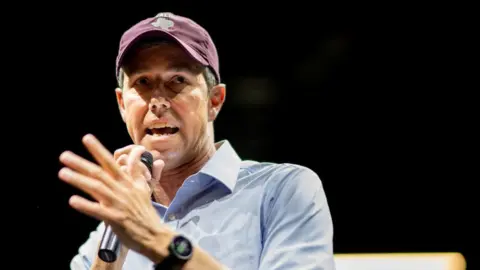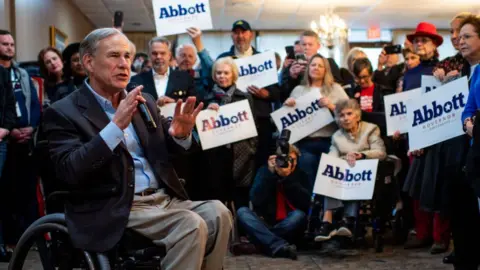Texas governor race: Beto O'Rourke, Greg Abbott, and two visions of America
 Getty Images
Getty ImagesThe race for Texas governor is a battle over two visions of America. Can Democrat Beto O'Rourke harness growing support for gun control and abortion rights to win - or will concerns over crime and immigration return Republican Greg Abbott to office?
Beto O'Rourke stood in the middle of a music hall in Houston, Texas, surrounded by cheering supporters.
He had been introduced by Hamilton musical creator Lin Manuel Miranda and can count pop star Harry Styles and actor Matthew Broderick among his backers.
A former congressman from the border town of El Paso, Mr O'Rourke, 50, stands for everything liberal America wants: gun control, abortion rights, "racial justice" for minorities and a plan for tackling climate change.
Long tipped as a rising star on the Democratic left - despite a failed 2018 Senate run - Mr O'Rourke now has his sights on another high-profile office.
But to become governor of Texas, he'll have to get by the sitting Republican, Greg Abbott - a man who could not be more different.
Seeking his third four-year term, the 65-year-old may not have Mr O'Rourke's celebrity endorsements, but he is a political powerhouse in his own right. He won re-election four years ago by more than 13% of votes and is the best political fund-raiser in Texas history.
The Abbott agenda is Mr O'Rourke's opposite. Instead of abortion, guns and the environment, he focuses on rising undocumented immigration numbers and violent crime rates. He blames a national economy that is sputtering under high inflation on Democratic President Joe Biden's policies.
Texas may not be a battleground state for control of Congress this year, but the race of left and right unfolding between the two men is the textbook contest of American politics.
And if Mr O'Rourke loses - as it appears likely - it could be a wake-up call to liberals across the country about the limits of their power, political stardom and vision for the country.

Texas has been reliably conservative for decades - the last Democrat elected to a state-wide political office was in 1994.
But demographics are pointing to a more tightly contested future - and recent developments have made Texas liberals angry enough to hope that things might change sooner rather than later.
Texas has been smack dab in the middle of numerous pivotal issues of national importance. Some of the first challenges to abortion protections came in the state, and some of the country's strictest voting rules were passed here after 2020. The murder of 21 children and teachers at a primary school in Uvalde, Texas, thrust gun control back into the national spotlight. Much of the recent torrent of undocumented migrants entering the US has come across the Texas-Mexico border.
All these issues have bubbled to the surface in the Texas governor's campaign.
On the stage in Houston, Mr O'Rourke's stump speech hammered Republicans.
"We lead the nation in school shootings," he said. "So numbingly common it has become in Texas that we somehow tacitly accept this as the price of living and dying in this state right now."
He listed some of the accomplishments of his 2018 Senate campaign, which came close but ultimately failed to oust the arch-conservative Republican, Ted Cruz: He was the first Democrat to win the state's four largest cities since 1964, got the largest voter turnout in Texas since 1970 and helped a grass-roots organisation elect local Democrats.
The audience cheered what they saw as moral, if not always actual, victories.
It was a cross-section of the state's Democratic coalition - racial minorities, young voters, labour unionists and LGBT activists - and women outnumbered men by more than two to one.
Leslie Sellers, a mum and fitness trainer, said the recent Supreme Court ruling overturning abortion rights was a major motivating factor to vote.
"I think there are a lot of angry women who are like, wait a minute, how can you take a right away from me?" she said.
Not everyone in the crowd agreed. Marisela Rodriguez, a schoolteacher, was sceptical that voters understood the impact of strict abortion bans on women's health.
She remained optimistic, however. "Democrats always have a chance," she said. "We just have to get the vote out."
 Getty Images
Getty ImagesIn the same state, but in a different universe, Mr Abbott's campaign was drawing rather different audiences.
Alongside sheriffs in the Gulf of Mexico port of Corpus Christi and at a county Republican dinner in Brownsville - a border town on the southern tip of the state - the incumbent governor eschewed big rallies, opting instead for set-piece speeches and round-table meetings.
Mr Abbott, who has used a wheelchair since a 1984 jogging accident left him paralysed below the waist, is soft-spoken and controlled. His campaign has mocked Mr O'Rourke's celebrity endorsements, focusing instead on advertising and strategically placed campaign trips.
That he visited the Texas-Mexico border last week was no coincidence. While polls show his support is largely white and male, Republicans have made inroads with the state's Hispanic voters, particularly those in the regions along the frontier.
"Nobody in Washington has a clue about what's going on at the border," Mr Abbott said at his Corpus Christi event. "It was just two and a half years ago that we had the fewest illegal border crossings in decades. Under President Biden, we had the most illegal border crossings ever."
Mr Abbott's laser-like focus on immigration, the economy and crime seems to be working. A recent survey from the University of Texas found Mr O'Rourke and Mr Abbott both at 48% among Hispanic voters.
Armando Rósales, an emergency medical worker in the border county of Maverick, said he's seen Republicans gain considerable ground with Hispanic voters along the border. Mr Rósales thought the governor was doing "an excellent job" - and particularly liked that Mr Abbott had recently bussed immigrants north to Washington DC and other cities. "He's making those other cities feel the same pressure that we are feeling," he said.
"Texas' growing Hispanic community is not tied to a political party and is increasingly flexing its muscles to decide elections," said Daniel Garza, a south Texan and president of the conservative Libre Initiative.
That shift seems to be happening across much of the US, as conservatives pursue similar campaign strategies.
Despite a spike in support during the summer following the Supreme Court abortion decision, Mr O'Rourke's campaign has fallen behind, with polls showing him trailing Mr Abbott by an average of eight percent.
At this point, the Democrat would only win if there is a significant error in the surveys, said Jim Henson, director of the Texas Politics Project at the University of Texas.
"Hope springs eternal for Democrats," Mr Henson said. "But I think this election is going to give us a lot of information about what our expectations should be."


What questions do you have about the US midterms?
In some cases your question will be published, displaying your name, age and location as you provide it, unless you state otherwise. Your contact details will never be published. Please ensure you have read our terms & conditions and privacy policy.
Use this form to ask your question:
If you are reading this page and can't see the form you will need to visit the mobile version of the BBC website to submit your question or send them via email to YourQuestions@bbc.co.uk. Please include your name, age and location with any question you send in.

